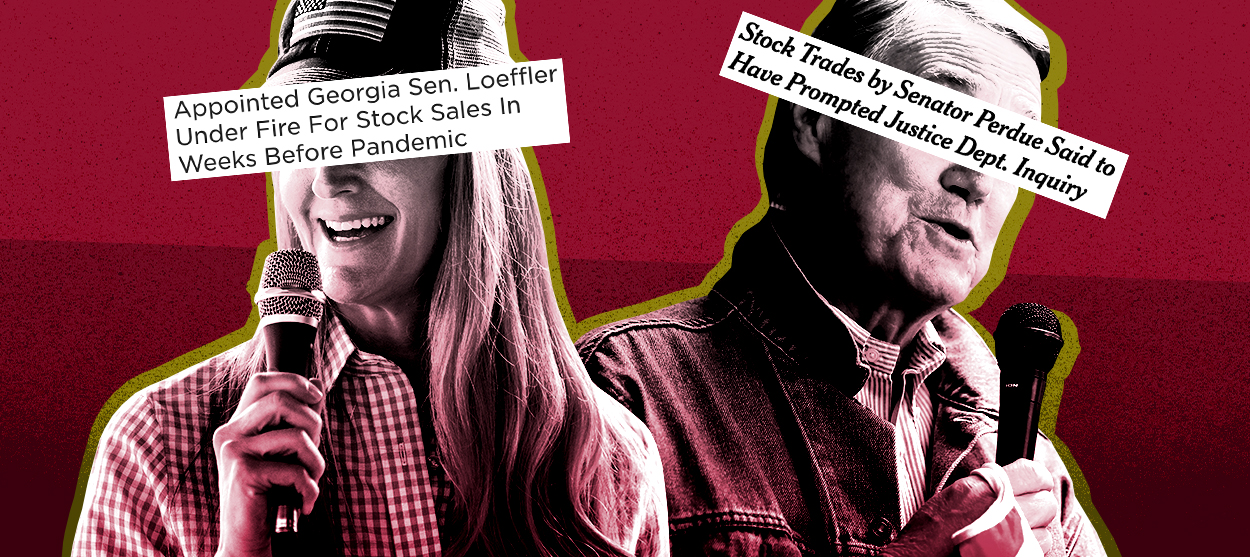Will Georgia show Democrats ran the wrong campaign against Trump?
If your opponent is a corrupt Republican billionaire, maybe you should talk about it


A free daily email with the biggest news stories of the day – and the best features from TheWeek.com
You are now subscribed
Your newsletter sign-up was successful
"It's time for [Republican Senator Kelly Loeffler] to answer for this pattern of self-dealing and corruption," Democratic Senate candidate Rev. Raphael Warnock demanded Saturday, along with a clip of his opponent dissembling in their recent debate.
"Happy Sunday," his fellow Democrat Jon Ossoff greeted supporters, "Why hasn't David Perdue put his stocks in a blind trust yet?"
The double runoff in Georgia to determine control of the United States Senate is a rare election where a significant change in campaign message can be truly tested in the same cycle. Did the Biden campaign, and the Democratic Party as whole, make a mistake by not focusing aggressively on Donald Trump and other top Republicans? Were the party's failure to capture the Senate and disappointing House results simply products of running the wrong campaign?
The Week
Escape your echo chamber. Get the facts behind the news, plus analysis from multiple perspectives.

Sign up for The Week's Free Newsletters
From our morning news briefing to a weekly Good News Newsletter, get the best of The Week delivered directly to your inbox.
From our morning news briefing to a weekly Good News Newsletter, get the best of The Week delivered directly to your inbox.
What voters did hear from the Biden campaign this year was primarily about health care, national unity, and COVID-19. The Democratic candidate's pitch was a mostly positive message of restoring dignity to the office, protecting the Affordable Care Act, and competently handling the pandemic. What was mostly absent was talk of Trump's corruption. For example, in the final week before the election, Biden tweeted about health care and defending the Affordable Care Act 10 times, the COVID-19 pandemic 15 times, but only once about Trump's corruption. Biden's so-called "closing argument" television ads reflected similar themes, and this was a pattern throughout the entire campaign.
These messages didn't seem to resonate strongly in swing states, though. Both Fox News and CNN exit polls found Trump with a slight edge in those states on the question of who would better handle COVID-19, and the Fox poll found slightly more support for repealing at least part of the Affordable Care Act than there was for keeping it.
Meanwhile, Democrats went easy on the Trump administration throughout his time in office. House Democrats could have gotten Trump's tax returns from New York state before the election but didn't push for them because they worried it would appear too partisan. Numerous scandals by Trump cabinet officials didn't receive full hearings or threats of impeachment. Even when House Democrats did impeach President Trump, Speaker Nancy Pelosi decided to go for a "narrow" impeachment focused only on the election interference issue. Then that impeachment was barely mentioned by Biden or any other Democrats during the campaign.
By comparison, when House Republicans knew they would likely face Hillary Clinton in 2016, over the course of more than two years they spent $7 million holding 33 hearings to produce an 800-page report on just the 2012 terrorist attack in Benghazi. It was a relentless effort that, despite its thin factual premise, laid the groundwork for much of the prolonged controversy over Clinton's use of a private email server which undoubtedly drove down Clinton's favorable numbers and eventually her turnout.
A free daily email with the biggest news stories of the day – and the best features from TheWeek.com
While some might argue that 2016 Trump voters didn't seem to care about his self-dealings, Democrats didn't need to convert those 2016 voters, they just needed to stop Trump from growing his base. A four-year long focus on doggedly pursuing Trump's many scandals and flagrant corruption would have made it harder for Trump to win over new supporters, and could have convinced infrequent, Republican-leaning voters that they might as well stay home. If Trump had only gotten the same number of votes he did in 2016, Biden would have easily won Florida, Texas, and North Carolina. Instead, Trump's approval rating barely moved during his presidency, and he increased his popular vote total by 11 million. That increased Republican turnout was also the primary difference between the Democratic wave in the 2018 midterms and the Democrats' anemic House and Senate results this year.
This is what makes the Georgia runoff elections a perfect test case. Now, Democrats are running the corruption-focused campaign they didn't run against Trump, heavily highlighting Republican senators' well-timed stock trades after receiving nonpublic information. Over one week in early December, Ossoff tweeted 14 times about Republican Sen. David Perdue's "corruption" and questionable stock trades. Similarly, 10 of Warnock's tweets were about Loeffler "personally profiting off the pandemic" after getting a secret briefing on COVID-19. This message is also featured heavily in the ads currently saturating the state.
Democrats entered these runoffs behind. In the November election, Perdue led Ossoff 49.73 percent to 47.95 percent. And while Warnock technically led Loeffler 32.9 percent to 25.91 percent, that special election was effectively an open primary, with all the Republican candidates collectively winning 50.5 percent of the two-party vote to Democrats' 49.5 percent. The Democratic party needs to make up significant ground, and a corruption argument could be what does it.
According to Democratic pollster Stanley Greenberg, his message testing in 2016 and 2018 showed a strong positive response to calling out corrupt political deals. If Democrats manage to pull off a double win in Georgia, it would be more strong evidence that a campaign that attacks incumbents' perceived corruption can move voters, or at least convince the incumbents' potential supporters to stay home. It would imply the Democrats missed a golden opportunity to make even larger gains this November by not putting Trump's misdeeds at the very center of their message.
Jon Walker is the author of After Legalization: Understanding the Future of Marijuana Policy. He is a freelance reporter and policy analyst that focuses on health care, drug policy, and politics.
-
 The ‘ravenous’ demand for Cornish minerals
The ‘ravenous’ demand for Cornish mineralsUnder the Radar Growing need for critical minerals to power tech has intensified ‘appetite’ for lithium, which could be a ‘huge boon’ for local economy
-
 Why are election experts taking Trump’s midterm threats seriously?
Why are election experts taking Trump’s midterm threats seriously?IN THE SPOTLIGHT As the president muses about polling place deployments and a centralized electoral system aimed at one-party control, lawmakers are taking this administration at its word
-
 ‘Restaurateurs have become millionaires’
‘Restaurateurs have become millionaires’Instant Opinion Opinion, comment and editorials of the day
-
 The billionaires’ wealth tax: a catastrophe for California?
The billionaires’ wealth tax: a catastrophe for California?Talking Point Peter Thiel and Larry Page preparing to change state residency
-
 Bari Weiss’ ‘60 Minutes’ scandal is about more than one report
Bari Weiss’ ‘60 Minutes’ scandal is about more than one reportIN THE SPOTLIGHT By blocking an approved segment on a controversial prison holding US deportees in El Salvador, the editor-in-chief of CBS News has become the main story
-
 Has Zohran Mamdani shown the Democrats how to win again?
Has Zohran Mamdani shown the Democrats how to win again?Today’s Big Question New York City mayoral election touted as victory for left-wing populists but moderate centrist wins elsewhere present more complex path for Democratic Party
-
 Millions turn out for anti-Trump ‘No Kings’ rallies
Millions turn out for anti-Trump ‘No Kings’ ralliesSpeed Read An estimated 7 million people participated, 2 million more than at the first ‘No Kings’ protest in June
-
 Ghislaine Maxwell: angling for a Trump pardon
Ghislaine Maxwell: angling for a Trump pardonTalking Point Convicted sex trafficker's testimony could shed new light on president's links to Jeffrey Epstein
-
 The last words and final moments of 40 presidents
The last words and final moments of 40 presidentsThe Explainer Some are eloquent quotes worthy of the holders of the highest office in the nation, and others... aren't
-
 The JFK files: the truth at last?
The JFK files: the truth at last?In The Spotlight More than 64,000 previously classified documents relating the 1963 assassination of John F. Kennedy have been released by the Trump administration
-
 'Seriously, not literally': how should the world take Donald Trump?
'Seriously, not literally': how should the world take Donald Trump?Today's big question White House rhetoric and reality look likely to become increasingly blurred
